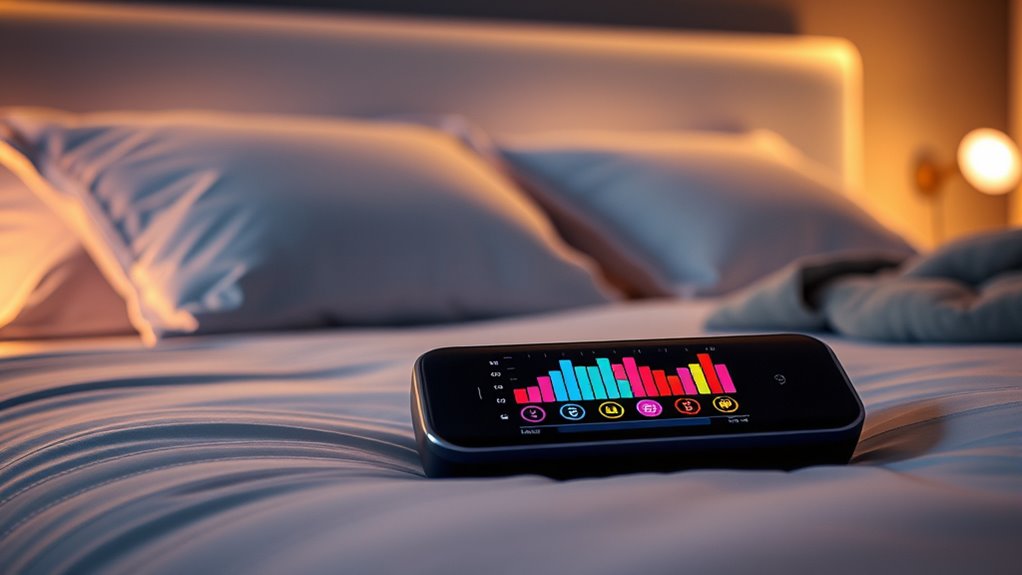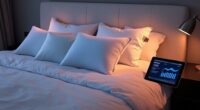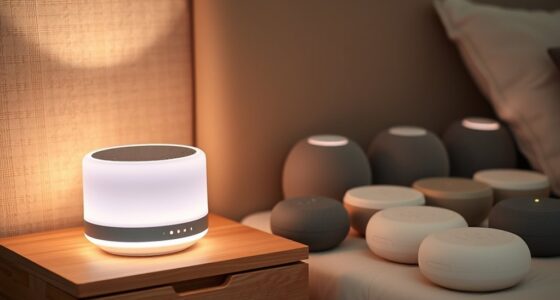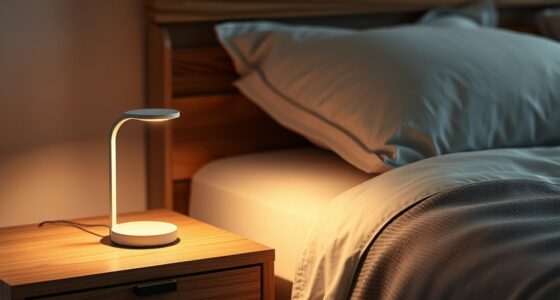A sleep score is a number that shows the overall quality and restorative nature of your sleep each night. It considers factors like sleep cycle continuity, how restful your sleep is, and whether you wake up frequently. Good scores usually mean you had enough deep and REM sleep, while lower scores suggest disruptions or poor rest. Understanding these scores helps you identify patterns and improve your sleep habits—if you want to learn more, keep exploring what influences your sleep quality.
Key Takeaways
- Sleep scores reflect overall sleep quality, indicating how restorative and effective your sleep has been each night.
- They are influenced by sleep cycle continuity, including deep sleep and REM stages, and disruptions reduce the score.
- A high sleep score suggests restful, uninterrupted sleep, while a low score may signal sleep disturbances or poor habits.
- External factors like stress, environment, and screen time can impact sleep quality and, consequently, your sleep score.
- Monitoring your sleep score helps identify patterns and guides improvements in sleep routines for better overall health.

Have you ever wondered what your sleep score really means? Your sleep score offers a snapshot of how well you’re resting each night, but understanding what influences it can help you improve your sleep habits. At its core, your sleep score reflects the overall quality of your sleep, which is determined by several factors, including the sleep cycle and how restful your sleep truly is. When your sleep cycle is smooth and uninterrupted, you tend to get better sleep quality, which often results in a higher score. Conversely, frequent awakenings or disruptions can lower your score, signaling that your sleep isn’t as restorative as it could be.
Your sleep cycle plays a fundamental role in shaping your sleep score. During a typical night, you go through multiple cycles, each lasting about 90 minutes, shifting between light sleep, deep sleep, and REM sleep. These stages are essential for physical and mental restoration. When your sleep cycle flows seamlessly, you get enough deep sleep and REM phases, which are essential for feeling refreshed and alert the next day. If your sleep cycle gets interrupted—say, you wake up frequently or have trouble falling into a deep sleep—your sleep quality diminishes. This often leads to a lower sleep score, signaling that your rest isn’t as effective as it could be.
A smooth sleep cycle with enough REM and deep sleep boosts your sleep quality and score.
Understanding your sleep score can also help you recognize patterns and habits that influence your sleep quality. For example, late-night screen time, caffeine intake, or stress can interfere with your sleep cycle, making it harder to reach those restorative sleep stages. If your sleep score consistently drops, it might be time to evaluate your bedtime routine or environment. You may find that creating a calming pre-sleep routine or ensuring your bedroom is dark and cool can promote a healthier sleep cycle, ultimately boosting your sleep quality. Paying attention to sleep cycle regularity can help you identify issues that may be affecting your rest and guide you toward better habits.
In essence, your sleep score isn’t just a number; it’s a reflection of how well your body goes through its natural sleep cycle and how restorative that sleep truly is. By paying attention to what influences your sleep quality—such as sleep cycle regularity—you can make informed changes to improve your nightly rest. Better sleep isn’t just about quantity; it’s about getting the right kind of sleep, which your score can help you track. Over time, understanding these nuances will empower you to develop habits that support healthier sleep patterns and, in turn, a higher sleep score.
Frequently Asked Questions
How Often Should I Check My Sleep Score?
You should check your sleep score regularly, especially after sleep tracking each night, to understand your sleep patterns better. Reviewing your data interpretation weekly helps you identify trends and make necessary adjustments to improve your rest. Don’t obsess over daily scores; instead, focus on consistent tracking and broader patterns over time. This approach keeps you informed and motivated to enhance your sleep quality effectively.
Can Sleep Scores Predict Long-Term Health Issues?
Sleep scores can give you insights into your sleep quality, but they’re not definitive for predicting long-term health issues. While consistently poor scores may hint at potential health risks, they shouldn’t replace medical advice or diagnostics. Use sleep scores as a tool to track patterns and improve your habits. For accurate health predictions, consult healthcare professionals who can evaluate your overall health and sleep quality thoroughly.
Do Sleep Scores Vary Significantly Between Different Devices?
You might worry that sleep scores differ across devices, but with proper device calibration, scores become more consistent. While some variation exists due to different algorithms, most modern devices aim for score consistency. Think of it like tuning a guitar; calibration helps ensure the notes, or scores, align closely. So, your sleep score may vary slightly between devices, but reliable calibration minimizes these differences, giving you a clearer picture of your sleep health.
How Accurate Are Sleep Scores for Light Sleepers?
You might wonder how accurate sleep scores are for light sleepers, and device accuracy varies. Light sleep detection can be less precise because many devices rely on movement and heart rate, which might not always reflect light sleep stages accurately. If you’re a light sleeper, your device may sometimes overestimate or underestimate your sleep quality. Keep in mind, though, that improvements in sensor technology are gradually enhancing sleep stage detection accuracy.
Can Improving My Sleep Score Reduce Health Risks?
Improving your sleep score can reduce health risks by enhancing your overall sleep quality. Focus on good sleep hygiene, like maintaining a consistent sleep schedule and avoiding screens before bed. Also, optimize your sleep environment by keeping it dark, cool, and quiet. These habits help you sleep more deeply and restorative, lowering risks of issues like heart disease, diabetes, and weakened immunity. Better sleep habits lead to healthier, more energized days.
Conclusion
Now that you understand sleep scores, you’ll see how they reflect your overall rest quality. Did you know that only about 20% of people get enough deep sleep each night? Improving your sleep score can boost your health and energy levels. Keep tracking, make adjustments, and watch your sleep improve. Remember, a better night’s rest starts with understanding what your sleep score really means. Sweet dreams and better mornings are just a few steps away!









